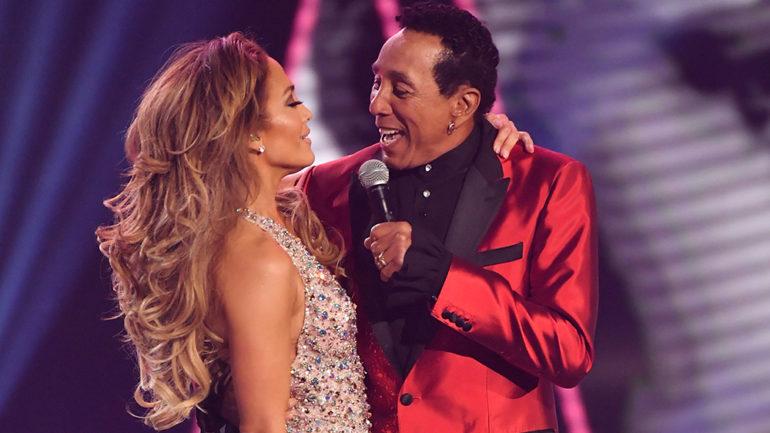Why Was Jennifer Lopez Representing Black Music History at the Grammys? (Column)
By Jeremy Helligar
LOS ANGELES (Variety.com) – It’s only February, and 2019 already has been a tough year for star-studded A-list events. The Academy of Motion Pictures Arts and Sciences had to scramble to fill a job nobody wanted after Kevin Hart stepped down as Oscar host amid controversy over his homophobic past on social media. The NFL found itself in a similar position while planning its halftime show due to its shoddy treatment of Colin Kaepernick over his kneel-in protest to racism in the U.S.
The National Academy of Recording Arts and Sciences have had its share of rough times this year, too. Ariana Grande bowed out of performing at the Grammys and boycotted the ceremony entirely over a showdown with the event’s producers over which song she would perform. And according to reports, Drake, Kendrick Lamar, and Childish Gambino (a.k.a. Donald Glover) all declined to perform, allegedly due to the ’ recent history of not rewarding black performers in the big categories.
The Recording Academy has fielded charges of racism for years, and as with AMPAS, the response has been to ramp up the diversity of its voting community. For the 2019 show, the Grammys tried to show its appreciation of black music history as well as contemporary black music artistry with its 60th-anniversary tribute to Motown, the record label that put black music and black performers on the pop map.
So why did they go and make it basically a showcase for Jennifer Lopez? She joined Smokey Robinson, Ne-Yo, and 2019 Grammy host Alicia Keys for a medley of some of Motown’s greatest hits, but Lopez was given the largest portion of the segment and became its de facto headliner.
The temptation to go with Lopez likely had everything to do with ratings. She’s a huge superstar, and also the center of one of Grammys’ most memorable moments this century. (Remember the plunging green dress?) But where is the R-E-S-P-E-C-T in so heavily featuring a white Latina performer in a tribute to a record label that was dedicated to grooming black talent when blacks were still relegated to the back of the bus, in life and in entertainment?
Gladys Knight, who was just unanimously praised for her performance of the National Anthem at the Super Bowl, was signed to the Motown label in the ’60s along with the Pips. In fact, they had a massive hit with “I Heard It Through the Grapevine” before Marvin Gaye made it iconic.
Social media slammed the 74-year-old singer for daring to cross the symbolic picket line by performing at the Super Bowl, but featuring her in the Motown tribute would have been a way for the Recording Academy to show that it knows and appreciates black music history. (Both the Super Bowl and the Grammys aired on CBS, so there was no conflict of interest there.)
As criticism mounted, defended Lopez’s involvement. “I don’t think anyone who is intelligent is upset,” he told Variety. “I think anyone who is upset is stupid.
“Motown was music for everybody. Everybody,” he said, also suggesting that growing up in a Hispanic neighborhood (the Bronx) gives her black cred. “Who’s stupid enough to protest doing something for Motown?”
With all due respect to Robinson, a singer-songwriter who was one of the chief architects of the Motown legend, dismissing all critics of the Motown line-up as “stupid” is not a sign of high intellect. It’s not so much that Lopez was included as that she was featured more heavily than any of the other participants. She got six songs and two minutes and 47 seconds, compared to one song and 42 seconds for Robinson, three songs and one minute and 18 seconds for Keys, and one song and one minute and 34 seconds for Ne-Yo.
Why not pay tribute to Motown by paying tribute to Motown artists, too? Robinson was the only performer in the segment with deep ties to the label.
Many of Motown’s leading stars are no longer with us, but Stevie Wonder, who famously saved Madonna when Billboard inexplicably chose her to pay tribute to Prince at the 2016 Billboard Music Awards, is alive and still kicking. So are Motown talents spanning multiple music generations: Martha Reeves, Lionel Richie, Boyz II Men, Brian McKnight, Erykah Badu, 98 Degrees, India.Arie, and the Supremes’ Mary Wilson.
Diana Ross, also formerly of the Supremes, got her own 75th-birthday tribute at the Grammys, but as one of Motown’s greatest and most-enduring alumni, she would have been a much better fit to headline the medley than Lopez. The Grammys had the opportunity to recreate a little bit of the magic of 1984’s “Motown 25: Yesterday, Today, Forever,” but the Recording Academy squandered it.
To be fair, spotlighting Lopez in the Motown tribute isn’t in the same league as the NFL inviting a white act, Maroon 5, to headline the Super Bowl halftime show in Atlanta, in the midst of racism controversy. Georgia’s capital has such a significant black population, and it’s associated with numerous black music superstars, including Usher, TLC, and Toni Braxton. Yet, Maroon 5 got the gig and Adam Levine was allowed to bare his nipples, the body part that led to the blacklisting of Janet Jackson after Justin Timberlake accidentally revealed hers on live television during the 2004 Super Bowl halftime show.
Janet Jackson might have been too close to the Michael Jackson “Leaving Neverland” controversy for the Recording Academy’s comfort, but considering that February is Black History Month, the Grammys should have aimed blacker than Lopez when training its Motown spotlight. There are other tributes worthy of J. Lo as the headliner, but this one, a celebration of a record label that was dedicated to celebrating black talent when few other labels cared, deserved a black talent as its star.

